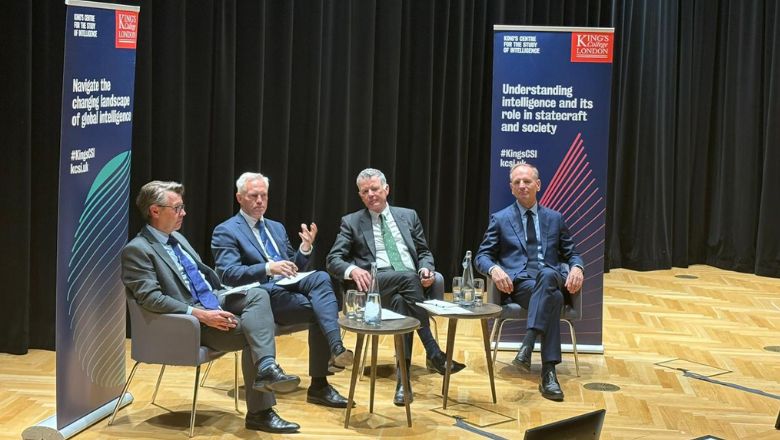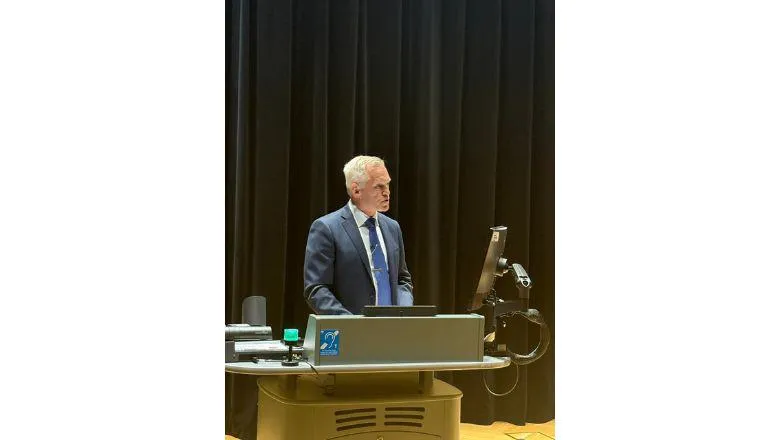We continue to share very many common interests and concerns, as well as, of course, very closely aligned values.”
Sir Richard Moore, Chief of the UK's Secret Intelligence Service - MI6
09 June 2025
British & Norwegian Intelligence Directors reaffirm strategic cooperation in live address at King's
The Director of the Norwegian Intelligence Service (NIS) – Vice Admiral Nils Andreas Stensønes – and the Chief of the UK’s Secret Intelligence Service (MI6) – Sir Richard Moore – discussed the history of Anglo-Norwegian intelligence cooperation in a presentation at Bush House on Thursday 5 June. The event, entitled: “Anglo-Norwegian intelligence cooperation: how we got here” was introduced by Lord Simon Stevens, Chair of King’s College Council, and Professor Wyn Bowen, Head of King’s School of Security Studies.

MI6’s Sir Richard Moore set the scene with his introduction of Admiral Stensønes. He noted the “extraordinarily close” intelligence relationship between the UK and Norway which began 85 years ago when Germany invaded Norway in April 1940 and continues today in the face of current threats:
The presentation to a select audience of British & Norwegian academics and other participants was only the second time the head of a foreign intelligence service has delivered a speech in London. Introducing the two service directors, Professor Bowen noted how this reflects the closeness of these parallel Anglo-Norwegian services and the particular relevance of King’s School of Security Studies:
We have a long history of collaborating with academics and other colleagues in Norway across a range of defence and security issues. We have senior Norwegian academics in our faculty. We have many Norwegians studying on our War Studies programmes, including our doctoral programme, and also on courses our Defence Studies colleagues teach on at the Defence Academy."
Professor Wyn Bowen, Head of School, Security Studies
A discussion of intelligence cooperation between nations, hosted at King’s, could hardly have taken place against a more relevant geopolitical backdrop. On Monday, the UK’s Strategic Defence Review was released pledging a sustained commitment to defence funding, in which efficiently utilised intelligence between forces is a key factor. Coinciding with Admiral Stensønes’ presentation, Defence Ministers were meeting at NATO in Brussels in advance of the summit in the Hague at the end of June. Less than a month ago, King’s hosted the London Defence Conference on the theme of alliances. And all these events are taking place as we mark 80 years since the end of the Second World War, as summed up by Admiral Stensønes:
Last month we marked the anniversary of Norway’s liberation from Nazi Germany. At the same time, war once again rages in Europe. In this context, the hard-fought victories from 80 years ago still provide valuable lessons for us today.”
Vice Admiral Nils Andreas Stensønes, Director of the Norwegian Intelligence Service
Stensønes took the opportunity to address Europe’s role in tackling Russia’s military aggression against Ukraine, thanking Britain for “leading the way” and acknowledging the wider implications of the nature of this war:
Any victory on Russia’s part will only strengthen the Kremlin’s belief in offensive military force as a way to promote its authoritarian policies. The threat from Russia’s aggression is enhanced by the People’s Republic of China, which enables the Russian warfare. And simultaneously, extremism is a fertile environment for growth through conflicts in the Middle East and Africa. In this environment, the common benefits from our cooperation are more significant than ever.”
Vice Admiral Nils Andreas Stensønes, Director of the Norwegian Intelligence Service

The Admiral recounted the history of the connection between UK and Norwegian intelligence services, revisiting key moments and turning points which forged the relationship during those challenging years. Of particular note was the evacuation to London of King Haakon VII of Norway, his family and his government. This led to the establishment of a Norwegian government in exile and gave the two countries the opportunity to combine efforts analysing and leveraging intelligence on Germany’s wartime strategy and movements.
None of us had experience with large scale resistance activities in occupied territory, but we had to accept that we needed to trust each other. This is all the more difficult when lives are at stake. And lives were at stake almost all the time. Faced with such challenges, we managed to focus on our common goals. Based on this humble beginning, we produced some impressive results together.”
Vice Admiral Nils Andreas Stensønes, Director of the Norwegian Intelligence Service
These collective intelligence operations burgeoned over the course of the war. 200 Norwegian agents were trained and deployed, with 1,800 supporters of various kinds operating from over 140 stations and producing over 5,500 reports. The impact of this work was far reaching and critical to the direction of the war. For example, the reporting contributed to sinking battleships like the Bismarck, damaging cruisers and merchant ships, and cutting by 75% the volume of precious iron ore that the Germans were importing from Norway.
He also highlighted Operation Gunnerside – “surely the most successful sabotage operation of the Second World War” – which targeted a hydrogen production factory near Rjukan in Norway to stop Germany producing heavy water that could be used to make nuclear weapons. The mission involved multiple players including a support team who survived for weeks in appalling weather conditions on the Hardangervidda plateau, Joachim Rønneberg who planned and led the operation, and the operational team whose only route home after fulfilling their brief involved skiing hundreds of kilometres from Norway to Sweden.
Gunnerside was just one example of Norwegian and British forces achieving key strategic results through combined effort. Stensønes touched on various others, including the “Shetland Bus” – an ongoing system in which a clandestine special operations group of Norwegian fishermen in their own boats transferred agents and equipment in and out of Norway via Shetland. Almost half lost their lives in the process.
The many operations and activities I have described would never have been possible without the close collaborations between British and Norwegian personnel. As we mark the 80th anniversary of our liberation in 1945, we can look back with pride at what our countries and our respective services achieved together during those five long years. Of course, there were difficulties. But we found pragmatic ways of dealing with them. In doing so we became closer still. The achievements I have described today, and plenty more, remain an inspiration for us all.”
Vice Admiral Nils Andreas Stensønes, Director of the Norwegian Intelligence Service
Bringing the focus back to the present day, Admiral Stensønes acknowledged the enduring links between Norway and the UK since becoming founding members of NATO. He observed the growing need for both nations to work just as effectively with other allies as they have done with each other, building on a long-established trust and common way of working.
We apply the same mutual attitude as in 1940. We focus on the common goal, talk through our differences and get on with it. It is reassuring that we can draw on our shared experience of previous hardship, commitment and success as we face any future threats together.”
Vice Admiral Nils Andreas Stensønes, Director of the Norwegian Intelligence Service
Questions from the audience were invited after Admiral Stensønes’ talk and included topics such as the war in Ukraine, which he stated is a “privilege and necessity” to support, confirming that there is “great trust” between the Norwegian Intelligence Service and Ukraine.
On the subject of possible security challenges in the Arctic, he observed that Russia is currently behaving “responsibly” in this area but it is likely of increasing interest and has the potential for escalation.
Asked about challenges around recruiting to intelligence services in the present day, Stensønes talked about the NIS’s success in diversifying recruitment styles to support working in modern technology. He also openly acknowledged the enduring cruciality of developing and retaining talent.
It is so important to keep the good people with skills and experience. I’m just trying to fix the goal, set the barriers, coach the middle managers, and they're doing a fantastic job. Let the organisation do the job.”
Vice Admiral Nils Andreas Stensønes, Director of the Norwegian Intelligence Service
This event was coordinated by representatives of the Department of War Studies: Dr Tony Insall, Visiting Professor, and Jessi Gilchrist, PhD candidate, in association with King’s Centre for the Study of Intelligence. Dr Insall has researched and published widely on the subject of intelligence – specifically in Norway – and completed a posting in Oslo during his time working for the Foreign and Commonwealth Office. His book Secret Alliances provides a definitive appraisal of Anglo-Norwegian cooperation during the Second World War.




